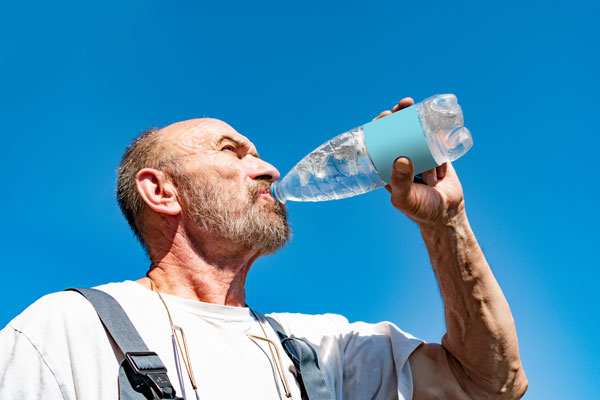Most people are aware of the increased risks that being overweight, smoking or having chronic stress can mean for heart conditions. Many of us don’t stop to think about the effect that high temperatures can have on our cardiovascular system.
When temperatures rise, your body has to work harder to control its temperature. One of the primary ways it does this is by circulating more blood, allowing heat to radiate out of the body via your skin. In order to circulate more blood, your heart beats faster. Up to twice as much blood can be circulated per minute on a hot day compared to a cooler one. This puts an increased workload on the heart. You will also start to sweat, which can lead to dehydration. This can cause blood pressure to drop. In addition to being under stress from trying to regulate your body temperature, there is also the risk of heat exhaustion and stroke.
While the burden of hot and humid weather is not usually a concern for people with healthy hearts, it can have serious risks for those with heart conditions. This applies particularly to those conditions that are undiagnosed or not well-managed.
The good news is that taking simple actions to stay cool can minimize the risks. We encourage everyone to take precautionary actions when the weather is hot, especially if it is prolonged or coupled with high humidity.
- Don’t overexert yourself.
Exercising will raise your heart rate higher, which can overstress your heart. It also increases your risk for dehydration and heat exhaustion. To avoid these risks, exercise outside during the cooler morning or evening hours. Exercise indoors in an air-conditioned space, or take your workout to the pool.
- Stay hydrated.
Avoiding dehydration is key in high temperatures, especially during heat waves when hot weather persists for many days. Drink plenty of fluids, opting for water or electrolyte beverages. Avoid caffeinated drinks and alcohol, as they can contribute to dehydration.
- Keep cool.
Staying inside in air conditioning is your best option during hot weather. If you must be outside, wear light clothing and a wide-brim hat. Seek shade whenever possible. Stay hydrated, and apply sunscreen regularly. Find somewhere cool to rest if you begin to feel unwell.
- Check your medications.
Medications like diuretics and beta-blockers can make it harder for you to control your body temperature during extreme heat. Speak with your doctor or pharmacist about any medications that you are taking and appropriate precautions during hot weather.
- Monitor blood pressure.
If you have high blood pressure or other cardiovascular conditions, monitor your
blood pressure during extreme heat or heat waves.
It’s also important to look out for signs of heat exhaustion and heat stroke. Although it can happen to anyone, patients with cardiovascular conditions are at a higher risk.
The symptoms of heat stroke include:
- Core body temperature of 104° F and above
- Headache
- Dizziness
- Hot, dry skin
- Excessive sweating
- Fast heartbeat
- Shallow and rapid breathing
- Nausea and/or vomiting
- Confusion
- Seizures
- Unconsciousness
Heat stroke can be life-threatening. If you or someone else shows signs of heat stroke, seek immediate emergency medical help.
The team at Advanced Cardiovascular Specialists consists of North Louisiana’s leading experts in cardiovascular care. For more information or to schedule an appointment, please call our office at (318) 798-9400.

